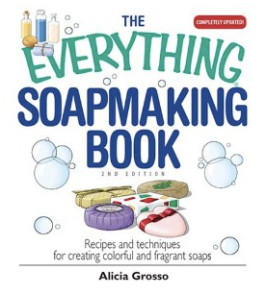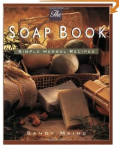I was recently reading a book that discussed the Top Ten Events in the process of becoming a Soapmaker (The Everything Soapmaking Book, by Alicia Grosso). It’s a good book by the way, for those starting out. Well, the list made me think back to the days when I was just dabbling in the art of making soap. Never did I think I’d become so addicted. It was really JUST a hobby. Something to do to relax and take me back to my creative roots. Little did I know that some 12+ years later I would be building a business.
Soapmaking Book, by Alicia Grosso). It’s a good book by the way, for those starting out. Well, the list made me think back to the days when I was just dabbling in the art of making soap. Never did I think I’d become so addicted. It was really JUST a hobby. Something to do to relax and take me back to my creative roots. Little did I know that some 12+ years later I would be building a business.
Let’s take a look at the list. And if it applies to you, watch out. You are on your way to becoming addicted! And as far as I know there is no 12 step program for the recovering Soapmaker!
- You become intrigued by the idea of making soap. For me this happened when I started making Melt and Pour Soap. I picked some up at my local hobby shop along with some scents and additives. I quickly out grew that process and was ready to start making soap from scratch.
- You observe your first signs of trace. I found a local art studio that offered a basic soap making class. There I saw trace for the first time. I was like a kid in a candy store. It was killing me to wait weeks until the Cold Process soap was ready for me to use.
- You actually use your soap for the first time. Needless to say the creaminess of the lather and knowing I had created it drove me to make more. I cleaned all the shower gels and loofahs out of my shower. It was handmade soap for me all the way.
- You make your first soap making friend on an online message board. I found I spent lots of time online researching, chatting and watching any kind of video I could find about soap. I was truly obsessed.
- You turn a disaster into something unexpectedly wonderful. The first time I experienced separation in my CP mold, I quickly threw it in a Slow Cooker and thought “well no better time than the present, to experiment with Hot Process”. The batch was saved and I realized I was able to use the soap much sooner. However, I have to say I’m still most partial to CP or CP-Oven Process soap.
- You fill up a soap making notebook for the first time. I stopped counting how many little note pads full of soap scribbles I have. I’ve tried to neatly consolidate them but that takes away from the charm of it all.
- You have your first dream about soap. I can’t say I’ve ever dreamed about soapmaking. But I can’t visit a mall or stay in a hotel without checking out all the soap and bath products. Reading labels and driving my friends and family crazy as I critique everything I see.
- Your family complains about all the soap stuff taking over the house. My pantry has more soaping products in it than food products. And one corner of my kitchen island is dedicated to my soap tools. They have to be in easy reach when a moment of inspiration hits me.
- Some one asks if they can buy some of your soap. I was just flattered when this happened. Although it took me years to actually start selling it. I just kept giving it away because it was so fun to make.
- You make soap so perfect you can’t believe how far you’ve come. One day my brother called me on his way to work and told me he was out of my cocoa butter soap and he looked down and was all ashy! He needed me to send him more pronto because he didn’t need to use lotion when he used my soap. It was at that moment I knew I had arrived. My brother is a “manly man” not finicky about soap, lotion, moisturizer and all that stuff. But he actually noticed a difference, so much so he called in an “order”. I launched my web-business shortly after. I know if I can just get people to try handmade soap. They will see the difference and get hooked.
Well that’s the story of my soaping addiction and I have no interest in working a 12 Step Program to free me from my need to craft soap in every free moment I have.
 Interested in giving it a try? A good starter book is “The Soap Book” by Sandy Maine
Interested in giving it a try? A good starter book is “The Soap Book” by Sandy Maine

Filed under: Family, Soap | 2 Comments »












